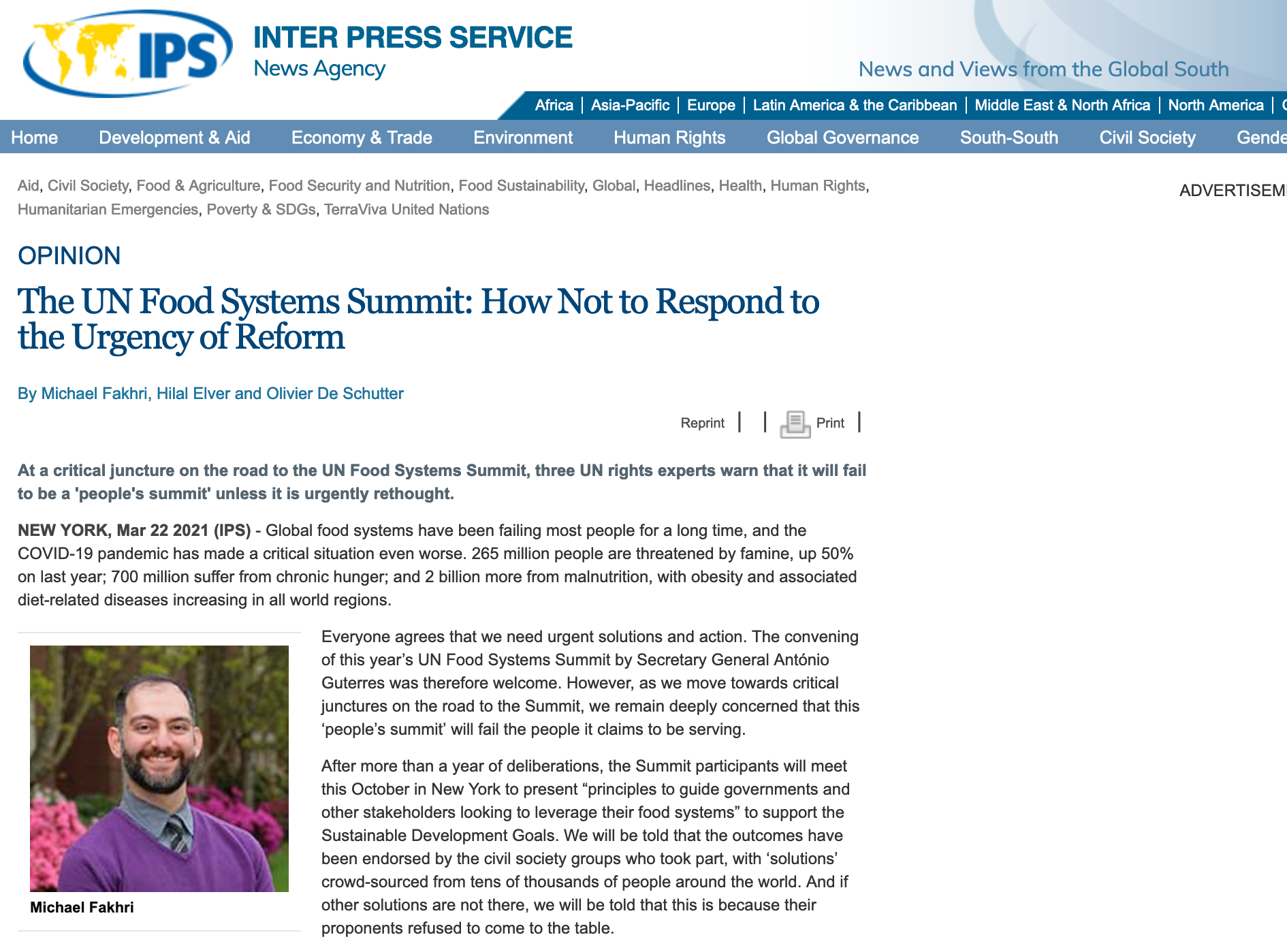By Michael Fakhri, Hilal Elver and Olivier De Schutter
From: http://www.ipsnews.net/2021/03/un-food-systems-summit-not-respond-urgency-reform/
At a critical juncture on the road to the UN Food Systems Summit, three UN rights experts warn that it will fail to be a ‘people’s summit’ unless it is urgently rethought.
– Global food systems have been failing most people for a long time, and the COVID-19 pandemic has made a critical situation even worse. 265 million people are threatened by famine, up 50% on last year; 700 million suffer from chronic hunger; and 2 billion more from malnutrition, with obesity and associated diet-related diseases increasing in all world regions.

Michael Fakhri
Everyone agrees that we need urgent solutions and action. The convening of this year’s UN Food Systems Summit by Secretary General António Guterres was therefore welcome. However, as we move towards critical junctures on the road to the Summit, we remain deeply concerned that this ‘people’s summit’ will fail the people it claims to be serving.
After more than a year of deliberations, the Summit participants will meet this October in New York to present “principles to guide governments and other stakeholders looking to leverage their food systems” to support the Sustainable Development Goals. We will be told that the outcomes have been endorsed by the civil society groups who took part, with ‘solutions’ crowd-sourced from tens of thousands of people around the world. And if other solutions are not there, we will be told that this is because their proponents refused to come to the table.
But coming to the table to discuss ‘solutions’ is not as simple as it sounds. What if the table is already set, the seating plan non-negotiable, the menu highly limited? And what if the real conversation is actually happening at a different table?
These concerns are still as pressing today as they were on day one.
First, the Summit initially bypassed the bodies already doing the very hard work of governing global food systems. The UN Committee on World Food Security (CFS) already has the structure that the Summit organizers have been hastily reconstructing: a space for discussing the future of food systems, a comprehensive commitment to the right to food, mechanisms for involving civil society and the private sector on their own terms, and a panel of experts regularly providing cutting-edge reports. In other words, everyone is already at the table. The Summit has flagrantly – and perhaps deliberately – shifted governments’ attention away from the CFS.

Hilal Elver
Second, the Summit’s rules of engagement were determined by a small set of actors. The private sector, organizations serving the private sector (notably the World Economic Forum), scientists, and economists initiated the process. The table was set with their perspectives, knowledge, interests and biases. Investors and entrepreneurs working in partnership with scientists framed the agenda, and governments and civil society actors were invited to work within those parameters. Inevitably, that has meant a focus on what the small group saw as scalable, investment-friendly, ‘game-changing’ solutions – the bread and butter of Davos. Reading between the lines, this means AI-controlled farming systems, gene editing, and other high-tech solutions geared towards large-scale agriculture.
As a result, the ideas that should have been the starting point for a ‘people’s summit’ have effectively been shut out. For over a decade, farmers, fishers, pastoralists, and food workers have been demanding a food system transformation rooted in food sovereignty and agroecology. This vision is based on redesigning, re-diversifying, and re-localizing farming systems. It requires that economic assumptions be questioned, human rights be protected, and power be rebalanced.
Some concessions have been made on the road to the Summit. But these changes have been too late, or too cosmetic, to impact meaningfully the process. Only in November was the CFS added to the Summit’s Advisory Committee. And only this month was the FAO’s Right to Food office invited to participate (with a limited mandate). Presumably there will be further changes at the margins: human rights will be mentioned in general terms, agroecology will be included as one of many solutions.
Olivier De Schutter
But this will not be enough to make the Summit outcomes legitimate for those of us — inside and outside the process — who remain skeptical. Having all served as UN Special Rapporteur on the Right to Food, we have witnessed first-hand the importance of improving accountability and democracy in food systems, and the value of people’s local and traditional knowledge. It is deeply concerning that we had to spend a year persuading the convenors that human rights matter for this UN Secretary General’s Food Systems Summit. It is also highly problematic that issues of power, participation, and accountability (i.e. how and by whom will the outcomes be delivered) remain unresolved.
Those of us who came to the Summit table did so in the hope that we could fundamentally change the course. As the end-game approaches, we still hope that this is possible. But radical change is needed:
-
-
- ● The right to food must be central to all aspects of the Summit, with attention on holding those with power accountable;
-
- ● Agroecology should be recognized as a paradigm (if not the paradigm) for transforming food systems, alongside actionable recommendations to support agroecological transition;
-
● The CFS should be designated as the home of the Summit outcomes, and the place where it is discussed and implemented, using its inclusive participation mechanisms.
In other words, to make this a people’s summit, the table needs to be urgently re-set.
Michael Fakhri is the current UN Special Rapporteur on the Right to Food.
Hilal Elver served as the UN Special Rapporteur on the Right to Food from 2014-2020.
Olivier De Schutter served as the UN Special Rapporteur on the Right to Food from 2008-2014, and is the current UN Special Rapporteur on Extreme Poverty and Human Rights, and co-chair of IPES-Food.



